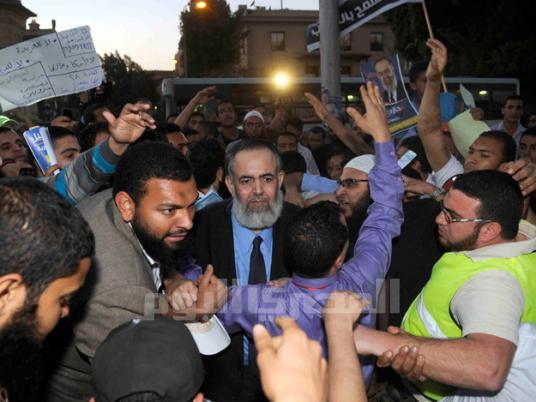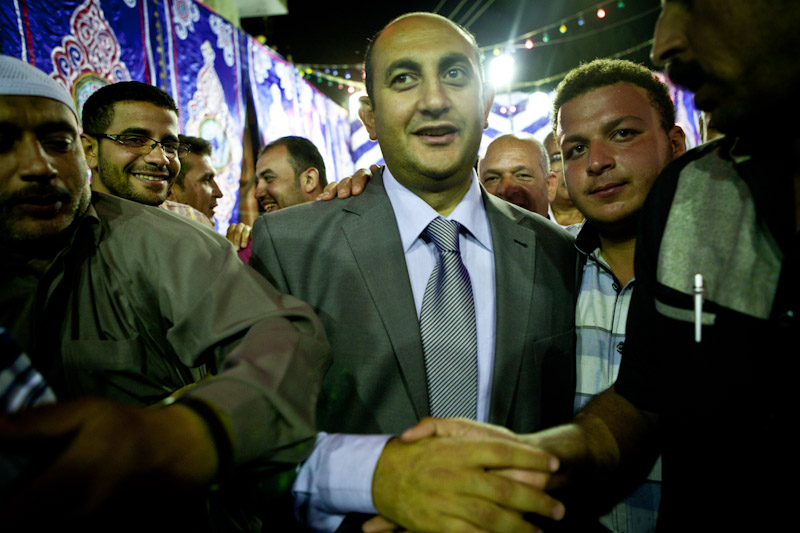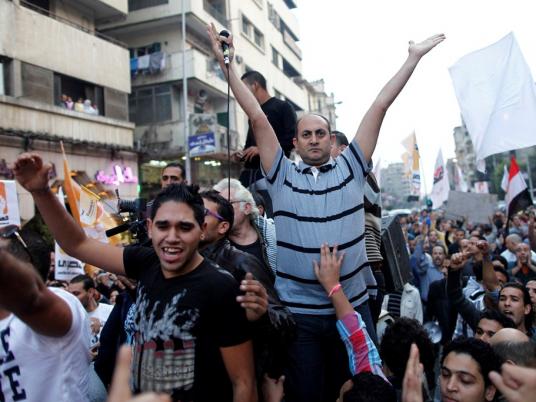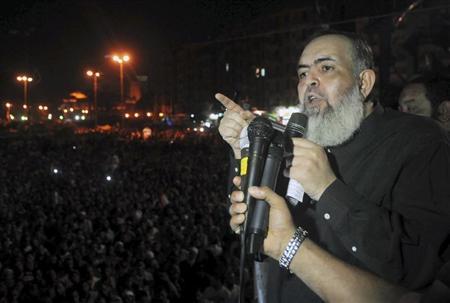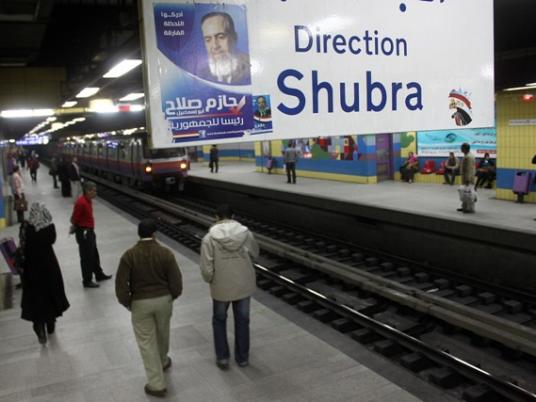
Presidential candidate Hazem Abu Ismail has gained an almost legendary status online in the past week because of his very visible offline presence, in the form of posters showing his smiling image next to a promise to Egyptians that they “will live with dignity.” The sheer frequency of these posters prompted the usual explosion of satirical photoshopping, to such an extent that eventually social networking platforms were as saturated with Hazem as the streets of Cairo.
The posters came to life on Friday, when Abu Ismail supporters gathered outside the Assad Ibn Forat Mosque in the Cairo suburb of Dokki (where Abu Ismail lives) for a motorcade to the offices of the Presidential Elections Commission in Heliopolis in celebration of Ismail's gathering over 100,000 signatures of support for his candidacy.
Hundreds of men lined both sides of the street outside the mosque, some of them wearing fluorescent vests or blue and white t-shirts, again insisting that we will live with dignity. March organizers waved traffic through a tunnel of Ismail posters in various incarnations; looking at the camera, smiling beatifically, holding one arm out in front of him and gesturing with his hand, prompting one person on Twitter to caption it, “Walk straight on until you reach the end of the road, mate, and then turn left.”
Friday prayers ended and the mellifluous intonation of the sermon gave way to the chants. “El shaab yoreed Hazem Ismail!” (The people want Hazem Ismail), they shouted, a variation on the chant that was the battle cry of Tunisia's revolution and which subsequently spread to the uprisings in Egypt, Syria, Libya and Bahrain.
They dug at the US, too, saying “Look Obama at Sheikh Hazem the learned man” and then dug at everyone. “Look you rubbish people [awbash], Sheikh Hazem is the master of the people [seed el nas].”
Busy handing out posters from the boot of her car, Hanan Saeed — an organizer in the “women's branch” of the Ismail campaign — explained why she supports Abu Ismail.
“He's the candidate I trust most not to lie,” Saeed said. This faith in Abu Ismail's probity and honesty was repeated by almost every supporter Egypt Independent spoke to and seemed as important, if not more important, than his political program.
Saeed almost pointed to Abu Ismail's “outspoken criticism” of deposed President Hosni Mubarak as an indication of his moral character. But what about Abu Ismail's rival, Abdel Moneim Abouel Fotouh, a former member of the Muslim Brotherhood who was detained under Mubarak for his political activity.
“Abouel Fotouh is a good man, and if Sheikh Hazem wasn't running I would vote for him,” Saeed said.
As behind her increasingly enthusiastic Ismail supporters chanted that “the people want the application of Sharia,” Egypt Independent asked Saeed whether fear of Abu Ismail, an Islamist candidate who espouses a particularly conservative interpretation of Islam, is justified.
“We won't make women wear the veil or cut off hands and ears. We're going to feed and educate and heal people first before we start talking about Sharia, and in any case there is no compulsion in religion,” Saeed said, quoting a Quranic verse.
The composition of today's rally demonstrated that Abu Ismail's appeal extends beyond his immediate Islamist constituency.
Nasser Ragab had come from Fayoum to show support for a man he said “has morals and cares about the Egyptian people and puts the small people first before the powerful.”
Standing next to him, Sabry Abdel Aziz from Boulaq al-Dakror described Abu Ismail as “one of us.”
“He will wipe away the tears of 30 years,” Abdel Aziz said with conviction.
Not everyone was so confident, though. A man approached two Abu Ismail organizers and in expletives dismissed all the presidential candidates as useless.
“And now they want Beardie to rule us,” he muttered as he walked away.
Egypt Independent asked the man, Esmet Mohamed, who works as a cleaner in a building next to the Assad Ibn Forat Mosque and who had just finished his shift, which presidential candidate he supports.
“I don't like any of them,” Mohamed said.
Mohamed insisted that while Abu Ismail has strong support from Salafis and the Muslim Brotherhood, “ordinary people from working class neighborhoods like El-Zawya El-Hamra where I'm from don't support him. It's only the people from the mosques who put his poster everywhere.”

